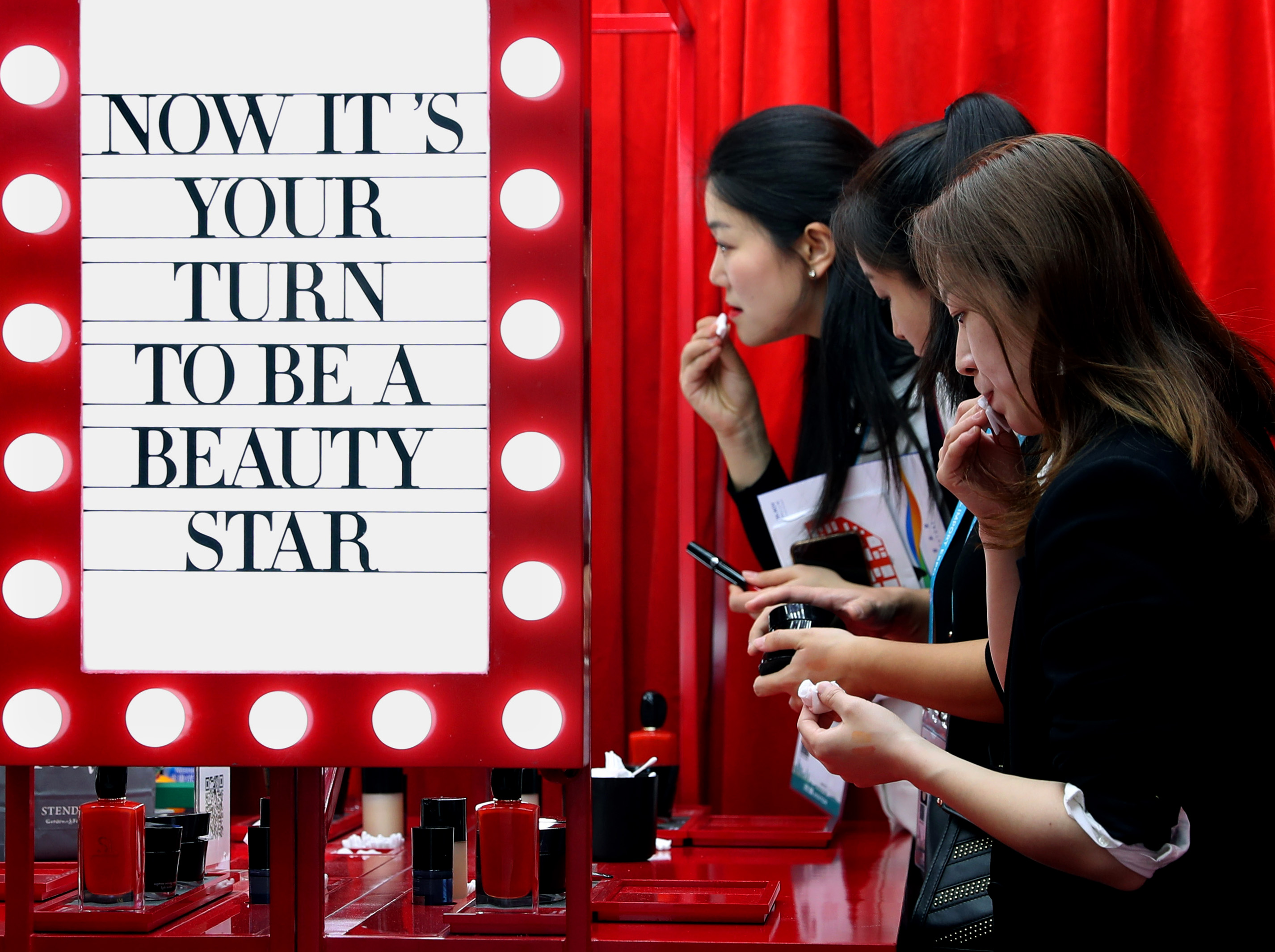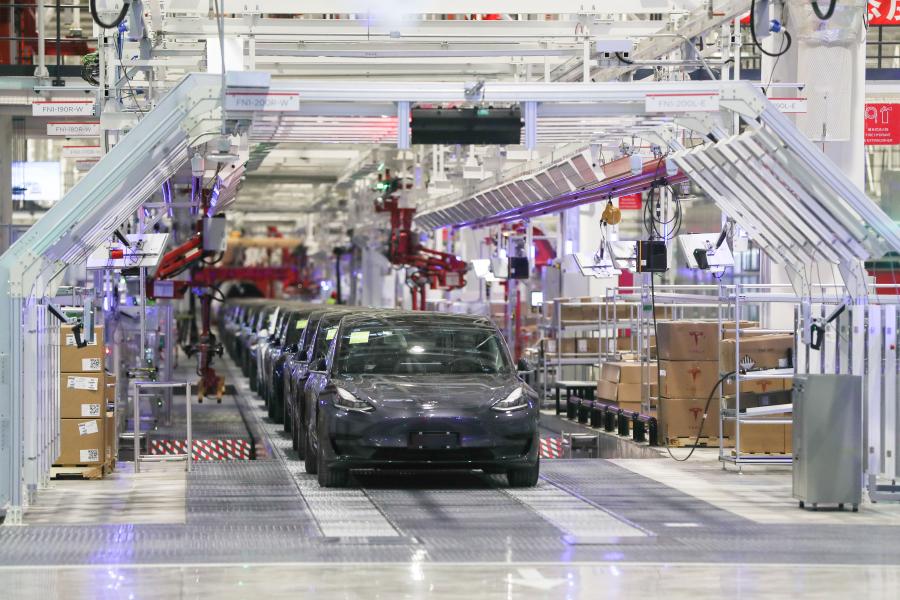Foreign investors bullish on Yangtze River Delta integration
More foreign enterprises are expanding their layouts in the Yangtze River Delta Region as China's epidemic prevention and control measures enter a new stage, saying "yes" to the country's improving business environment and economy.
The year 2020 has not been easy for retailers as they deal with temporary business closures as well as declining customer traffic and sales due to the COVID-19 pandemic.

Visitors try lipsticks at a booth of L'Oreal at the second China International Import Expo (CIIE) in east China's Shanghai, Nov. 6, 2019. [Photo/Xinhua]
Yet Uniqlo, a clothing brand under the Japan-based Fast Retailing Co., Ltd., opened 19 chain stores in China on a single day in mid-August, marking a further step into the Chinese market.
"We opened eight new stores in June and 19 in August. We're entering six new cities, including Zhejiang's Tongxiang and Jiangsu's Danyang, which signals our confidence in the Chinese market and Chinese economy despite COVID-19," said Jalin Wu, chief marketing officer of Uniqlo Greater China.
China is Uniqlo's biggest overseas market, and Uniqlo hopes to further explore the Chinese market by launching new apparel suitable for Chinese consumers, as well as exploring opportunities in more third-tier and lower-tier cities in China, she added.
As China's epidemic prevention and control measures enter a new stage, more foreign enterprises are getting back to business by setting up new stores, new factories and new R&D centers in the Yangtze River Delta, China's economic hub, saying "yes" to the country's improving business environment and economy.
Covering a 358,000-square km expanse, the Yangtze River Delta is one of the most populated and urbanized city clusters in China, contributing one-fourth of the country's gross domestic product.
Chinese authorities has called for efforts to promote trade and investment facilitation and strive to make the delta region an important bridge between the international and domestic markets.
New stores, recovering businesses
"COVID-19 has had an impact on the customer flow in retail stores, but with strict epidemic prevention and control measures, consumer confidence has gradually recovered, and customer flow has increased," Jalin Wu said.
Beginning in May, the sales of Uniqlo's retail stores in China have recovered to the level of the same period last year, and are expected to see year-on-year growth in July and August, she noted.
Since the epidemic outbreak, Uniqlo's official website, mobile app, Tmall flagship store, WeChat mini-program and physical stores have formed an innovative retail loop that enables customers to order online and get their purchases through door-to-door delivery or pickup at brick-and-mortar outlets.
The Japanese fashion retailer will attend the third China International Import Expo (CIIE), and Fast Retailing has reserved a 1,500-square-meter exhibition area.
Uniqlo was among several foreign enterprises to open new stores in China's Yangtze River Delta.
For French cosmetics giant L'Oreal, the economic recovery in China is a great boost to its global business as Europe is only gradually returning to normal after the huge blow from the coronavirus pandemic.
The company's YSL Beauty chose Shanghai as the location for its first perfume-themed store anywhere in the world, opening to the public in early June. The new store not only debuts limited edition perfumes, but also provides an immersive experience to consumers.
Fabrice Megarbane, CEO of L'Oreal China, voiced his confidence in the company's development in China, noting that the cosmetics market is quickly recovering.
Statistics from L'Oreal show that its sales on the Chinese mainland grew by 30 percent in the second quarter, recording a 17.5-percent growth in the first half of 2020.
Megarbane said the company's headquarters, research and innovation center in Shanghai, as well as its Suzhou plant, resumed operation on Feb. 10 with strict protective measures in place.
"It used to take hours to get to Suzhou from Shanghai, but now it's way under one hour," said Megarbane, adding that he is confident in the integration of the Yangtze River Delta, and the company benefits from such a strategy.

Photo taken on Jan. 7, 2020 shows an inside view of Tesla Shanghai gigafactory in east China's Shanghai. [Photo/Xinhua]
New factories, stabilizing industrial chain
"China is a stabilizer in the global supply chain," Megarbane said, noting that China's competitive advantages in the global supply chain are not just in cost and scale, but more in market potential, product quality and innovation capacity.
This view was echoed by U.S. electric carmaker Tesla, which began accepting orders for made-in-China Model Y SUVs on its China official website earlier this week. The production of the pre-ordered cars will begin as early as next year.
It has been less than eight months since the U.S. electric carmaker announced the launch of a project to manufacture Model Y vehicles in its Shanghai gigafactory, its first overseas plant outside the United States, in early January.
Tesla's founder Elon Musk expressed gratitude for the hard work of the Chinese team during his keynote speech at the opening ceremony of the World Artificial Intelligence Conference in July.
Tao Lin, vice president for external affairs at Tesla China, said the expansion of the Shanghai gigafactory is expected to be finished by year-end, and the mass production of made-in-China Model Ys will start in the first quarter of 2021.
The smooth and quick recovery of production in China has injected confidence into foreign companies.
Statistics showed that in the first half of this year, the actual amount of utilized foreign capital in Shanghai increased by 5.4 percent year on year, with 26 regional headquarters of multinationals newly set up in the city.
After participating in the second CIIE last November, Israeli hi-tech company Watergen, which produces high-quality drinking water from air, has set up its China headquarters in Shanghai and started investing and building factories in the Yangtze River Delta region.
"We are very optimistic about the prospects of the Chinese market," said Ivan Melnikov, Watergen's chief representative in China. The tech firm has already signed up for this year's CIIE.
New R&D centers, global innovation hub
In just five months, a salted egg yolk and cheese-flavored ice cream product has gone from nothing more than a bold idea to a bestseller in China.
It was one of the innovative products developed by the Fonterra-ACC Shanghai Innovation Center, jointly set up by New Zealand-based multinational dairy cooperative Fonterra and food quality certification firm Anchor Center for R&D and Certification (ACC Shanghai).
If the innovation process had taken place in R&D centers overseas, it would have been about three years before the product could enter the Chinese market, according to Paul Washer, chief financial officer of Fonterra for Greater China.
The center was officially put into use in mid-August after several months of trial operation, a fresh move demonstrating Fonterra's confidence in the Chinese market and its long-term commitment to cultivating the market.
"China is one of the fastest-changing food and beverage markets in the world. Only with higher innovation efficiency and faster production of new products can we better adapt to the Chinese market," Washer said.
As an extension of Fonterra's research capabilities worldwide, the Shanghai facility is designed for product development, sensory assessments, consumer science, nutrition science and packaging, among other functions.
"As one of the world's largest dairy companies, Fonterra is very optimistic about China's future," he added, noting that China is not only a consumer market, but also a critical source of innovation and an important part of the global industrial value chain.
In the first half of this year, a total of 10 foreign-funded R&D centers were set up in Shanghai. Boehringer Ingelheim, the world's leading pharmaceutical company, announced in March this year it would set up its first overseas BI X digital lab in Shanghai. The company also launched an external innovation hub in Shanghai this July.
"China has strategic importance to the company, and we have a long-term commitment to improving health outcomes and addressing unmet medical needs in China," said Felix Gutsche, chairman and CEO of Boehringer Ingelheim Greater China, adding that the company is investing 451 million euros in China over the next five years.
Cao Lei, deputy director of the commission of commerce in the Shanghai Pudong New Area, said foreign enterprises have been investing in R&D centers despite the epidemic, which shows China's prominence in the global innovation landscape.

